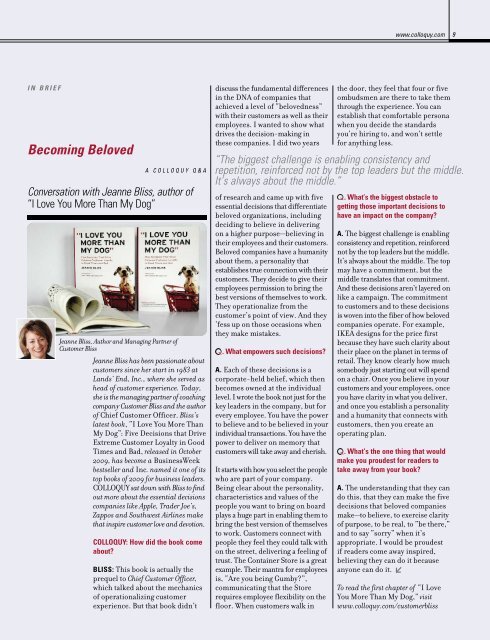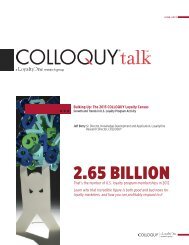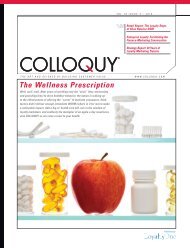Transformers - Colloquy
Transformers - Colloquy
Transformers - Colloquy
You also want an ePaper? Increase the reach of your titles
YUMPU automatically turns print PDFs into web optimized ePapers that Google loves.
I N B R I E F discuss the fundamental differences the door, they feel that four or five<br />
in the DNA of companies that ombudsmen are there to take them<br />
achieved a level of “belovedness” through the experience. You can<br />
with their customers as well as their establish that comfortable persona<br />
employees. I wanted to show what when you decide the standards<br />
drives the decision-making in you’re hiring to, and won’t settle<br />
these companies. I did two years for anything less.<br />
Becoming Beloved<br />
A C O L L O Q U Y Q & A<br />
Conversation with Jeanne Bliss, author of<br />
“I Love You More Than My Dog”<br />
Jeanne Bliss, Author and Managing Partner of<br />
Customer Bliss<br />
Jeanne Bliss has been passionate about<br />
customers since her start in 1983 at<br />
Lands’ End, Inc., where she served as<br />
head of customer experience. Today,<br />
she is the managing partner of coaching<br />
company Customer Bliss and the author<br />
of Chief Customer Officer. Bliss’s<br />
latest book, “I Love You More Than<br />
My Dog”: Five Decisions that Drive<br />
Extreme Customer Loyalty in Good<br />
Times and Bad, released in October<br />
2009, has become a BusinessWeek<br />
bestseller and Inc. named it one of its<br />
top books of 2009 for business leaders.<br />
COLLOQUY sat down with Bliss to find<br />
out more about the essential decisions<br />
companies like Apple, Trader Joe’s,<br />
Zappos and Southwest Airlines make<br />
that inspire customer love and devotion.<br />
COLLOQUY: How did the book come<br />
about?<br />
BLISS: This book is actually the<br />
prequel to Chief Customer Officer,<br />
which talked about the mechanics<br />
of operationalizing customer<br />
experience. But that book didn’t<br />
of research and came up with five<br />
essential decisions that differentiate<br />
beloved organizations, including<br />
deciding to believe in delivering<br />
on a higher purpose—believing in<br />
their employees and their customers.<br />
Beloved companies have a humanity<br />
about them, a personality that<br />
establishes true connection with their<br />
customers. They decide to give their<br />
employees permission to bring the<br />
best versions of themselves to work.<br />
They operationalize from the<br />
customer’s point of view. And they<br />
’fess up on those occasions when<br />
they make mistakes.<br />
. What empowers such decisions?<br />
A. Each of these decisions is a<br />
corporate-held belief, which then<br />
becomes owned at the individual<br />
level. I wrote the book not just for the<br />
key leaders in the company, but for<br />
every employee. You have the power<br />
to believe and to be believed in your<br />
individual transactions. You have the<br />
power to deliver on memory that<br />
customers will take away and cherish.<br />
It starts with how you select the people<br />
who are part of your company.<br />
Being clear about the personality,<br />
characteristics and values of the<br />
people you want to bring on board<br />
plays a huge part in enabling them to<br />
bring the best version of themselves<br />
to work. Customers connect with<br />
people they feel they could talk with<br />
on the street, delivering a feeling of<br />
trust. The Container Store is a great<br />
example. Their mantra for employees<br />
is, “Are you being Gumby?”,<br />
communicating that the Store<br />
requires employee flexibility on the<br />
floor. When customers walk in<br />
www.colloquy.com<br />
“The biggest challenge is enabling consistency and<br />
repetition, reinforced not by the top leaders but the middle.<br />
It’s always about the middle.”<br />
. What’s the biggest obstacle to<br />
getting those important decisions to<br />
have an impact on the company?<br />
A. The biggest challenge is enabling<br />
consistency and repetition, reinforced<br />
not by the top leaders but the middle.<br />
It’s always about the middle. The top<br />
may have a commitment, but the<br />
middle translates that commitment.<br />
And these decisions aren’t layered on<br />
like a campaign. The commitment<br />
to customers and to these decisions<br />
is woven into the fiber of how beloved<br />
companies operate. For example,<br />
IKEA designs for the price first<br />
because they have such clarity about<br />
their place on the planet in terms of<br />
retail. They know clearly how much<br />
somebody just starting out will spend<br />
on a chair. Once you believe in your<br />
customers and your employees, once<br />
you have clarity in what you deliver,<br />
and once you establish a personality<br />
and a humanity that connects with<br />
customers, then you create an<br />
operating plan.<br />
. What’s the one thing that would<br />
make you proudest for readers to<br />
take away from your book?<br />
A. The understanding that they can<br />
do this, that they can make the five<br />
decisions that beloved companies<br />
make—to believe, to exercise clarity<br />
of purpose, to be real, to “be there,”<br />
and to say “sorry” when it’s<br />
appropriate. I would be proudest<br />
if readers come away inspired,<br />
believing they can do it because<br />
anyone can do it.<br />
To read the first chapter of “I Love<br />
You More Than My Dog,” visit<br />
www.colloquy.com/customerbliss<br />
9




